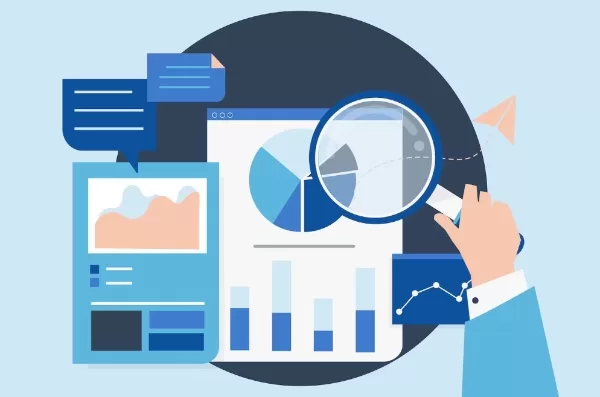Insights
Top AI Tools For Market Research You Should Know About
On Digitals
18/08/2025
35
It feels like every week there’s a new AI tool promising to revolutionize your business, doesn’t it? For marketers and business owners, the sheer number of options can be overwhelming, especially when it comes to a critical task like market research. The good news is, you don’t have to navigate this new landscape alone. This guide is all about simplifying your choices, helping you understand how to leverage the best AI tools for market research.
Why AI Tools for Market Research are a Game-Changer
Artificial intelligence is a transformative force that is fundamentally reshaping the market research landscape and you will be doing yourself a disservice if you’re not jumping on the trend.
From Manual to Automated
Historically, market research was a labor-intensive endeavor. Researchers spent countless hours on tasks like collecting data, cleaning up messy spreadsheets, and manually sifting through hundreds of survey responses. This left little time for the high-level, strategic thinking that is crucial for a successful campaign. AI has changed this paradigm completely by automating these repetitive tasks.
AI-powered platforms can automatically gather data from multiple sources, normalize formats, and even identify and correct errors, all in a fraction of the time it would take a human to do the same. This efficiency extends to the reporting process, where AI can generate real-time dashboards and reports, freeing up researchers to focus on interpreting the data and formulating actionable strategies. This shift from manual execution to strategic oversight is one of the most significant benefits of integrating AI into the research workflow.

Reasons to include AI tools for market research
The Power of Unstructured Data
Traditional market research has always relied on structured data, numbers, rankings, and pre-defined survey responses. While useful, this data only tells part of the story. The real goldmine of information often lies in unstructured data: the free-form text from customer reviews, the conversations on social media, or the open-ended responses in an interview. This type of data is too vast and complex for humans to analyze manually at scale.
This is where AI truly shines. Using Natural Language Processing (NLP), AI tools can analyze enormous volumes of unstructured data to understand sentiment, identify emerging trends, and uncover hidden patterns. For example, AI can determine not just what customers are saying about a product, but how they feel about it, sorting opinions into categories like positive, negative, or neutral sentiment. It can also identify subtle connections between seemingly unrelated topics, revealing deeper consumer motivations that would be impossible for traditional methods to detect.
Speed, Accuracy, and Efficiency
The combination of automation and advanced analytical capabilities results in a trifecta of benefits: speed, accuracy, and efficiency. AI can process massive datasets in minutes, allowing marketers to react to market shifts and emerging trends in near real-time. This agility provides a significant competitive advantage in today’s fast-paced environment.
Furthermore, AI-driven analysis reduces human error and cognitive bias, leading to more objective and reliable insights. By working around the clock, AI also provides a level of efficiency that manual research simply cannot match. This allows marketing teams to move from data collection to decision-making with unprecedented speed and confidence. The end result is a more data-driven, agile, and effective marketing strategy.
The Top AI Tools for Market Research: A Closer Look
Once you understand why AI is a game-changer for market research, the next step is to explore the tools themselves. The market is full of platforms, each with its own specialties, so picking the right one depends on your specific needs. Here’s a breakdown of some of the top AI tools available today, what they’re great at, and a few things to keep in mind.
For Social Listening and Consumer Insights: Brandwatch & GWI Spark
What they specialize in: These platforms are fantastic for monitoring social media and online conversations to understand brand sentiment, track trends, and identify what your audience is talking about. They scrape publicly available data (Brandwatch) or leverage proprietary survey data (GWI Spark) to give you a detailed picture of consumer behavior and preferences.
Pros:
- Real-time data: You get insights as they happen, which is crucial for crisis management and reacting to trends.
- Sentiment analysis: Go beyond mentions to understand how people feel about your brand or products.
- Comprehensive audience insights: These tools can help you build detailed audience profiles, from demographics to psychographics.
Cons:
- Can be costly: The advanced features often come with a high price tag, especially for enterprise-level use.
- Requires dedicated management: To get the most out of these platforms, you often need a team member who is an expert in managing and interpreting the data.

The best AI tools for consumer insights
For Competitive Intelligence: Crayon & Semrush Market Explorer
What they specialize in: These tools are your digital spies, tracking competitor activities across the web, social media, and other channels to give you a strategic edge. They help you stay ahead of product launches, pricing changes, and marketing campaigns.
Pros:
- Real-time alerts: Get instant notifications when a competitor makes a move, so you’re never caught off guard.
- Detailed dashboards: Visualize your competitive landscape with dashboards that show everything from traffic analytics to keyword strategy.
- Battle cards for sales teams: Crayon, in particular, excels at creating “battle cards” that give your sales team the intel they need to win against competitors.
Cons:
- Data source limitations: The depth of analysis may depend on the platform’s ability to crawl specific, private data sources, which can vary.
- Pricing: Both tools offer different tiers, but to get the most comprehensive data, you often need to pay for a higher-level subscription.
For Automating Surveys and Qualitative Analysis: Quantilope & Qwary
What they specialize in: This category of tools takes the pain out of traditional surveys and qualitative research. They can create intelligent surveys, analyze open-ended responses using advanced natural language processing (NLP), and generate interactive reports almost instantly.
Pros:
- Reduces manual data coding: Say goodbye to spending hours manually categorizing text responses. The AI handles it for you.
- Deep insights from unstructured text: Uncover themes and sentiments from open-ended questions that would be difficult to find otherwise.
- Agile research: Get results and actionable insights in a fraction of the time it would take with traditional methods.
Cons:
- Learning curve: These platforms are powerful, but they may require some time and training to fully master all their features.
- Can be a premium solution: While they save time, the cost of these specialized platforms can be a consideration.
For Conversational Research and Idea Validation: Perplexity AI & ChatGPT
What they specialize in: Think of these as your personal AI research assistants. They’re excellent for quickly summarizing reports, finding real-time information with cited sources (Perplexity AI), and brainstorming ideas. They’re a great entry point for those new to AI research.
Pros:
- Free or low-cost options: Both tools have free tiers, making them accessible to almost anyone.
- Easy to use: The conversational interface is incredibly intuitive, so you can start getting answers right away.
- Quick insights: They are perfect for generating initial research, exploring a new topic, or getting a quick summary of a long article.
Cons:
- Lacks depth: While great for a quick overview, their answers may not have the same depth or granularity as purpose-built market research tools.
- Accuracy concerns: It’s essential to fact-check information, as both models can sometimes “hallucinate” or provide misleading details.

The Deep Research function of LLMs have simplified market research
For In-Depth Financial and Market Intelligence: AlphaSense
What it specializes in: AlphaSense is a powerful, enterprise-grade platform for deep-dive financial and market intelligence. It offers access to a massive universe of proprietary content that other tools can’t touch, like broker research reports, expert transcripts, and SEC filings.
Pros:
- Unparalleled depth of content: Get access to a secure library of public and private content that is a game-changer for financial analysis.
- Enterprise-grade security: The platform is built for professionals who need to handle sensitive information securely.
- Powerful search and summarization: Its AI-powered search allows you to find relevant information and summarize key takeaways in a flash.
Cons:
- High cost: This is a premium, enterprise-level tool, and its cost reflects that. It’s not a solution for individuals or small businesses.
- Limited data visualization: While it excels at search and content, its data visualization features may not be as robust as some other specialized tools.
How to Choose the Right AI Tools for Your Business
As the landscape of AI-powered tools for market research continues to expand, it’s easy to get overwhelmed. The key isn’t to find the single “best” tool, but to find the right tool for your specific business needs. This guide will walk you through the essential steps to make an informed decision and ensure your investment pays off.
Define Your Research Goals
Before you even start looking at software, the most crucial step is to clearly outline your objectives. What specific problems are you trying to solve? Are you trying to understand customer sentiment on social media, analyze competitor pricing strategies, or automate the collection of survey data?
You should define a tangible goal, such as, “I need to identify the three most common pain points our customers mention in product reviews on Amazon.” To achieve this, it’s a great idea to talk to your marketing, sales, and product teams to identify the time-consuming tasks they wish they could automate. The right AI tool should be a solution to a real business problem.
Evaluate Integrations and Workflow
You must consider how the tool will integrate with your current marketing and business processes. Think about your existing platforms: Does the AI tool connect with your CRM (like Salesforce or HubSpot), your data visualization tools (like Tableau), or your social media management platform?
A tool that doesn’t integrate well can create data silos and lead to more manual work. It’s important to consider the entire research workflow. A tool that automates data collection but requires a cumbersome manual export process for reporting might not be worth the investment. It’s better to look for solutions that streamline the entire process from data ingestion to final reporting.

What to note when incorporating AI tools into market research
Look Beyond the Hype
The market is filled with bold claims and buzzwords. To make a smart choice, you need to understand the core technology behind the hype, because not all AI is created equal. Understanding what a tool actually does will help you make a better decision.
For instance, does the tool use Natural Language Processing (NLP) to analyze text? Is it based on machine learning for predictive analytics? A good vendor should be able to explain how their AI works in a way that makes sense to you, and how it delivers genuine value. Look for case studies, third-party reviews, and testimonials from companies in your industry. It’s also crucial to ask about the tool’s data privacy and security measures, especially if you’re dealing with sensitive customer data.
Start Small and Scale
You don’t need to commit to an expensive, enterprise-level platform right away. The best strategy is to experiment, learn, and then scale your investment. Start with a free or low-cost tool, or a free trial of a premium platform, and test it on a specific, well-defined problem.
For example, you could use a free AI tool to summarize a handful of competitor reports to see if the technology is effective for your needs. After your pilot, evaluate the results to measure the ROI. Did the tool save you time? Did it provide insights you couldn’t have gotten otherwise? This approach reduces risk and ensures you only scale up to a more comprehensive platform when you’re confident in the value it provides. After that, you may commit to a long-term subscription if it fits the bill.

Do not feel pressured to automate your entire operation right off the bat
FAQs About AI Tools for Market Research
Can AI completely replace human market researchers?
No, AI will not completely replace human market researchers. Instead, it acts as a powerful assistant that automates time-consuming tasks like data collection, data processing, and initial analysis. This frees up human researchers to focus on more strategic and nuanced work, such as interpreting qualitative data, understanding cultural and emotional context, and providing creative problem-solving and actionable insights that AI cannot replicate.
Are AI market research tools trustworthy and ethical?
The trustworthiness and ethics of an AI tool depend on its implementation. Ethical AI is fair, transparent, and accountable. To be trustworthy, a tool must avoid perpetuating biases from its training data, protect consumer privacy, and have a clear, explainable decision-making process. The responsibility falls on both the vendor to build the tool ethically and the user to apply it responsibly with human oversight.
How can I ensure the data used by AI tools is secure and private?
To ensure data security and privacy, you must implement several best practices. These include using robust encryption for data both in transit and at rest, maintaining strict access controls, and adopting data minimization and anonymization techniques to reduce the risk of a breach. Additionally, ensure that any tool you use is compliant with relevant data protection laws like GDPR or CCPA and that you conduct regular security audits.
What are the biggest limitations of using AI for market research?
A key limitation of AI is its difficulty in understanding nuance, emotion, and human intuition, which are all crucial for qualitative research. AI models can also inherit biases present in their training data, leading to skewed or inaccurate results. Lastly, while AI excels at identifying correlations in large datasets, it often struggles to determine the underlying causality, which can lead to misguided conclusions and poor business decisions.
Which AI is best for business research?
There is no single “best” AI tool for business research, as the right choice is entirely dependent on your specific research goals. Tools like Crayon are excellent for competitive intelligence, while Brandwatch specializes in social listening and sentiment analysis. For a broad range of tasks, a versatile tool like ChatGPT might be a good starting point, while platforms such as Quantilope are built for end-to-end consumer research. The best tool is the one that directly addresses the specific problem you are trying to solve.
Find Out Which AI Tools for Market Research You Should Use
Ultimately, the goal of integrating AI into your market research workflow is to make smarter, data-driven decisions. By defining clear goals, evaluating a tool’s integrations, looking past the marketing hype, and beginning with small-scale pilots, you can confidently navigate the AI landscape. Remember that the right tool won’t replace human intuition and expertise but will instead empower your team to focus on strategic insights and creative problem-solving.
On Digitals, as an experienced digital marketing agency, understands that effective market research is the foundation of every successful digital campaign. Our social outreach services leverage in-depth research and data analytics to understand your audience, identify key influencers, and develop authentic, engaging strategies. Learn more about how we can help your business shine with a data-driven approach to social outreach.
Read more
